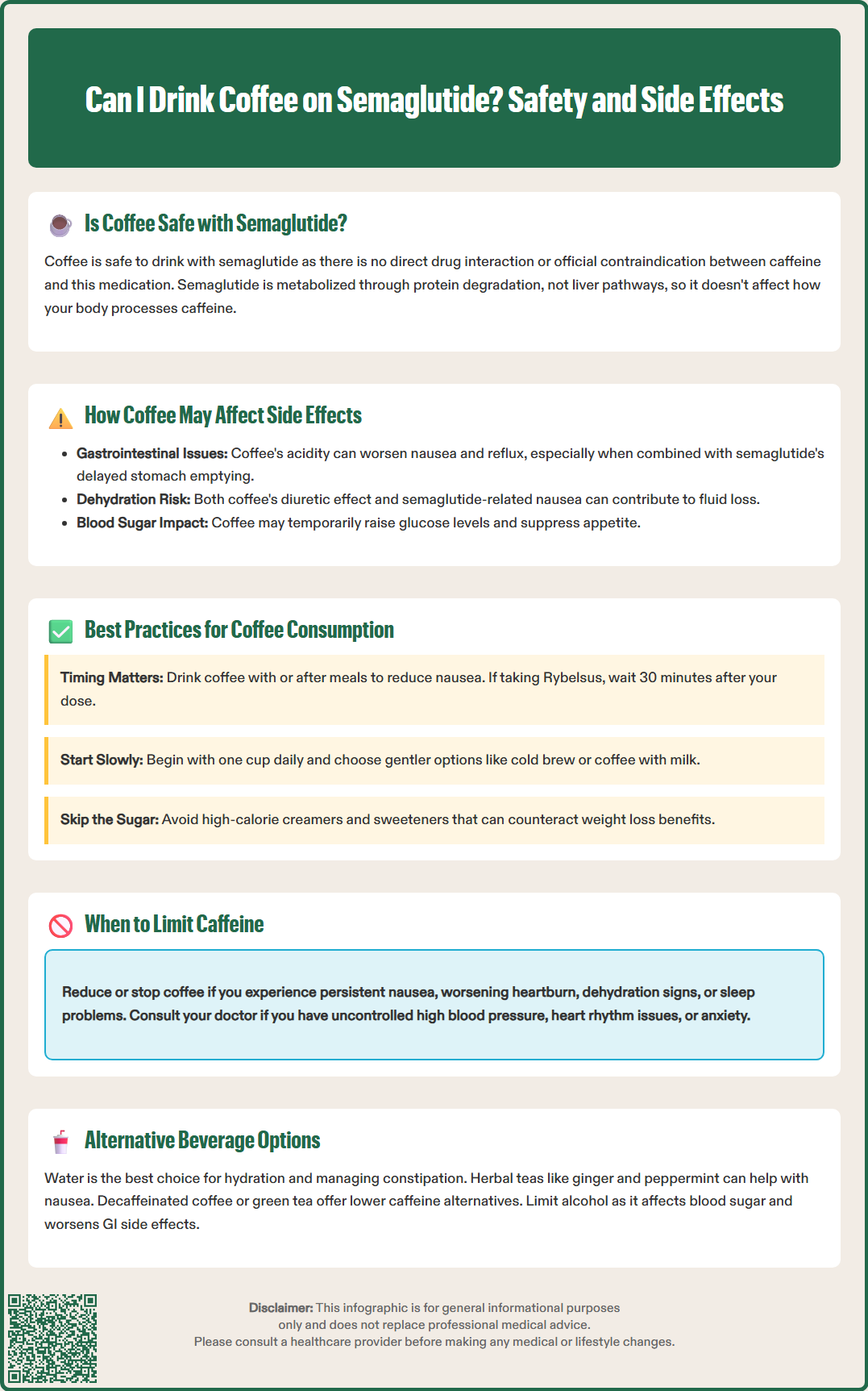LOSE WEIGHT WITH MEDICAL SUPPORT — BUILT FOR MEN
- Your personalised programme is built around medical care, not willpower.
- No generic diets. No guesswork.
- Just science-backed results and expert support.
Find out if you’re eligible

Many patients starting semaglutide (Ozempic, Wegovy, Rybelsus) wonder whether their daily coffee habit is compatible with treatment. The good news: there is no direct drug interaction between caffeine and semaglutide, and most people can continue drinking coffee safely. However, coffee may influence how you experience common gastrointestinal side effects like nausea and reflux. Understanding how coffee interacts with semaglutide's mechanism—slowed gastric emptying and appetite suppression—helps you optimize both medication effectiveness and comfort. This guide covers evidence-based recommendations for coffee consumption during semaglutide therapy, including timing strategies, preparation methods, and signs that temporary caffeine reduction may benefit your treatment experience.
Quick Answer: You can generally drink coffee while taking semaglutide, as there is no direct drug interaction, though coffee may worsen gastrointestinal side effects in some patients.
Yes, you can generally drink coffee while taking semaglutide. There is no official contraindication or direct drug interaction between caffeine and semaglutide (marketed as Ozempic, Wegovy, and Rybelsus) listed in the FDA prescribing information. Semaglutide is a glucagon-like peptide-1 (GLP-1) receptor agonist that works by enhancing insulin secretion, suppressing glucagon release, slowing gastric emptying, and reducing appetite. Coffee consumption does not interfere with these pharmacological mechanisms.
Many patients successfully continue their regular coffee habits throughout semaglutide treatment without adverse consequences. The medication is metabolized through protein degradation rather than hepatic cytochrome P450 pathways, meaning caffeine metabolism remains unaffected. However, individual tolerance varies considerably, and the gastrointestinal effects of semaglutide may influence how your body responds to coffee.
It is important to distinguish between the absence of a pharmacological interaction and the potential for coffee to exacerbate certain side effects. While coffee itself does not reduce semaglutide's effectiveness or create dangerous interactions, the combination may amplify gastrointestinal symptoms in some individuals. Patients should monitor their personal response and adjust consumption accordingly, particularly during the initial titration phase when side effects are most pronounced.
Note that semaglutide is not recommended for patients with severe gastroparesis. If you have specific concerns about coffee consumption related to your diabetes management, cardiovascular health, or medication regimen, discuss these with your healthcare provider. Individual medical history, concurrent medications, and treatment goals should guide personalized recommendations regarding dietary choices during semaglutide therapy.
The most common side effects of semaglutide are gastrointestinal in nature, with nausea occurring in up to 44% of patients in Wegovy clinical trials. Other common GI effects include vomiting, diarrhea, abdominal pain, and constipation, with varying frequencies across different semaglutide products. Coffee, particularly when consumed on an empty stomach or in large quantities, can independently cause or worsen these same symptoms due to its acidity and stimulant properties.
Caffeine stimulates gastric acid secretion and increases gut motility, which may potentially interact with semaglutide's effect of delayed gastric emptying. This combination might create a situation where the stomach empties slowly while acid production increases, potentially intensifying nausea and acid reflux in some individuals. Some patients report that their usual morning coffee becomes less tolerable during the first few weeks of semaglutide treatment, particularly following dose escalations.
Dehydration risk represents another consideration. Both caffeine's mild diuretic effect and semaglutide-induced nausea or vomiting can contribute to fluid loss. While moderate coffee consumption (2-3 cups daily) does not typically cause clinically significant dehydration in healthy adults, patients experiencing persistent gastrointestinal symptoms should ensure adequate fluid intake from non-caffeinated sources.
Coffee may also affect appetite and blood glucose levels independently. While caffeine can temporarily raise blood glucose through stress hormone release, this effect is generally modest and transient. Conversely, coffee consumption may suppress appetite in some individuals, potentially complementing semaglutide's appetite-reducing effects. However, this should not replace proper nutrition, as adequate protein and nutrient intake remains essential during weight loss therapy. Patients should monitor blood glucose patterns if they significantly change their coffee consumption habits while on semaglutide.
Timing matters significantly when combining coffee with semaglutide. Consider consuming coffee with or after meals rather than on an empty stomach to minimize gastrointestinal irritation. This approach helps buffer coffee's acidity and may reduce nausea, particularly during the initial weeks of treatment or following dose increases. For patients taking oral semaglutide (Rybelsus), which must be taken upon waking with no more than 4 ounces of plain water, wait at least 30 minutes before consuming coffee, food, or other beverages to ensure proper medication absorption.
Start with smaller quantities and assess tolerance. If you typically drink multiple cups daily, consider reducing to one cup during the first few weeks of semaglutide treatment, then gradually increasing as tolerated. Some coffee preparations may be gentler on the stomach than others, such as cold brew, which some find less acidic. Adding milk or a plant-based alternative may further reduce acidity, though be mindful of caloric content if weight management is a treatment goal.
Avoid adding excessive sugar, flavored syrups, or high-calorie creamers that can undermine semaglutide's metabolic benefits. The American Diabetes Association recommends limiting added sugars for optimal glycemic control. If you have type 2 diabetes, monitor how different coffee preparations affect your blood glucose levels, as individual responses vary.
Stay well-hydrated throughout the day, not relying solely on coffee for fluid intake. Aim for adequate hydration based on your individual needs and medical conditions, with urine that is pale yellow in color. Keep a food and symptom diary during the first month of treatment to identify patterns between coffee consumption and side effects. This information can help you and your healthcare provider optimize your routine and may reveal whether timing, quantity, or preparation method requires adjustment for your individual tolerance.

Persistent or severe nausea represents the primary indication for reducing or temporarily eliminating coffee. If you experience nausea lasting beyond the first few hours after your semaglutide dose, or if nausea interferes with adequate nutrition and hydration, consider discontinuing coffee temporarily to assess whether it contributes to symptoms. The FDA label notes that nausea typically improves over time as the body adjusts to semaglutide, but exacerbating factors should be minimized during this adaptation period.
Patients experiencing gastroesophageal reflux disease (GERD) or heartburn should consider limiting coffee, as caffeine can relax the lower esophageal sphincter and increase acid reflux. GLP-1 receptor agonists like semaglutide may worsen reflux symptoms in some individuals. If you develop new or worsening reflux symptoms after starting semaglutide, consider eliminating coffee temporarily and consult your healthcare provider. Antacid medications may be recommended, but if you take Rybelsus, avoid antacids within the 30-minute post-dose fasting window.
Cardiovascular considerations warrant attention in certain populations. While moderate coffee consumption is generally safe for most individuals, patients with uncontrolled hypertension, arrhythmias, or anxiety disorders should discuss caffeine intake with their healthcare provider. Semaglutide can cause a modest increase in heart rate (average 2-4 beats per minute), and excessive caffeine may compound this effect.
Limit or avoid coffee if you experience sleep disturbances, as adequate rest supports metabolic health and weight management. Caffeine consumed within 6 hours of bedtime can significantly impair sleep quality. Additionally, if you develop signs of dehydration—dark urine, dizziness, dry mouth, or decreased urination—particularly during episodes of vomiting or diarrhea, temporarily replace coffee with electrolyte-containing beverages and water.
Seek immediate medical attention if you experience severe, persistent abdominal pain (with or without vomiting) which could indicate pancreatitis, or symptoms of gallbladder disease such as right upper quadrant pain, fever, or yellowing of the skin. Stop taking semaglutide if these symptoms occur.
Water remains the optimal beverage choice during semaglutide treatment, supporting hydration without adding calories, affecting blood glucose, or irritating the gastrointestinal tract. Aim for consistent water intake throughout the day, using strategies like keeping a water bottle accessible or setting hourly reminders if needed. Adequate hydration may also help minimize constipation, a common semaglutide side effect.
Herbal teas offer a caffeine-free alternative that many patients tolerate well. Some individuals find that ginger tea may help with nausea, while peppermint tea might soothe digestive discomfort for some. Chamomile tea may help with relaxation and sleep quality. Avoid teas with added sugars or artificial sweeteners in excessive amounts, as these can affect satiety signals and glycemic control.
Electrolyte beverages become important if you experience vomiting or diarrhea. Choose low-sugar options or dilute sports drinks to avoid excessive carbohydrate intake. Oral rehydration solutions provide appropriate electrolyte balance without unnecessary additives. These beverages help prevent dehydration-related complications and support continued medication adherence.
For patients seeking alternatives to regular coffee, decaffeinated coffee provides familiar taste with minimal caffeine content, though it retains some acidity. Green tea offers lower caffeine levels (typically 25-50 mg per cup versus 95-200 mg in coffee) and may be better tolerated while still providing a mild energy boost. However, monitor tolerance individually, as some patients find even green tea exacerbates nausea.
Avoid or limit alcohol consumption, as it can affect blood glucose levels, impair judgment regarding food choices, add empty calories, and potentially worsen gastrointestinal side effects. The American Diabetes Association recommends limiting alcohol to moderate amounts (one drink daily for women, two for men) and always consuming with food. Carbonated beverages may increase bloating and should be limited if you experience these symptoms. Ultimately, beverage choices should support your treatment goals while maintaining comfort and adequate nutrition throughout semaglutide therapy.
No, coffee does not reduce semaglutide's effectiveness or create pharmacological interactions. Semaglutide is metabolized through protein degradation rather than liver pathways affected by caffeine, so coffee consumption does not interfere with the medication's glucose-lowering or weight management effects.
Coffee's acidity and caffeine stimulate gastric acid secretion while semaglutide slows gastric emptying, potentially creating a combination where acid production increases as the stomach empties slowly. This can intensify nausea and reflux, particularly during initial treatment weeks or after dose increases.
Consider avoiding coffee if you experience persistent severe nausea, worsening gastroesophageal reflux, signs of dehydration during gastrointestinal side effects, or if coffee interferes with adequate nutrition and hydration. Patients with uncontrolled cardiovascular conditions should discuss caffeine limits with their healthcare provider.
All medical content on this blog is created using reputable, evidence-based sources and is regularly reviewed for accuracy and relevance. While we strive to keep our content current with the latest research and clinical guidelines, it is intended for general informational purposes only.
This content is not a substitute for professional medical advice, diagnosis, or treatment. Always consult a licensed healthcare provider with any medical questions or concerns. Use of this information is at your own risk, and we are not liable for any outcomes resulting from its use.